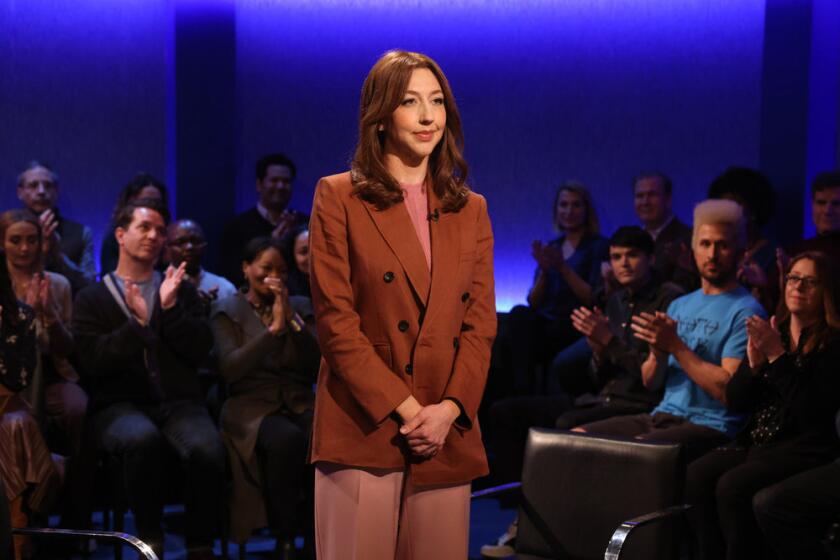Column: Angry while female: Why it matters that Beyonce, Kelly Ripa and Samantha Bee won’t hide their outrage
It’s tough to imagine Beyoncé, Kelly Ripa and Mary Pat Christie hanging out over mix tapes and Chardonnay, but all three recently revealed one common characteristic: the willingness to be angry in public while female.
They join a small but growing group of women, currently best symbolized by “Full Frontal’s” Samantha Bee, who increasingly reject the time-honored dictate that women must swallow their rage or cloak it in self-deprecating humor and/or apology to avoid being characterized as hysterical or crazy.
These women are angry, and they are no longer afraid to show it.
After blowing up halftime at this year’s Super Bowl with militaristic directness, Beyoncé surprise-dropped her album and companion film “Lemonade” on Saturday. Shattering car windows, artistic conventions and whatever divisions still exist between music, literature, film and television, Beyoncé walked us through the fury of betrayal. Scorched earth and dark hearts haven’t been this exquisitely evoked since “Apocalypse Now.”
Christie, meanwhile, managed to speak volumes with a single reflexive shift in expression.
Standing beside her husband, New Jersey Gov. Chris Christie, as they listened to Donald Trump celebrate his five-state primary sweep Tuesday night, the Garden State’s first lady reacted to Trump’s assertion that Hillary Clinton was “playing the woman’s card” with what may be the presidential campaign’s most significant irritated eye roll.
But it was Ripa who sparked a direct conversation about the issue of anger itself. Last week, after she was blindsided by the announcement that her co-host, Michael Strahan, was leaving “Live With Kelly & Michael” for an expanded role at “Good Morning America,” Ripa decided to take a few unscheduled days off. The immediate criticism of her “crazy” “meltdown” reaction and “diva-like” behavior was met with a backlash just as fast and even more furious. Like Ann Curry (unceremoniously pushed out as “Today” show co-host in 2012) and MSNBC’s Melissa Harris Perry (who told her staff she would not be used as “a token, mammy or little brown bobble head” for the network’s election coverage after her show was preempted without discussion), Ripa was seen by many as yet another woman being kept out of the loop of her own career by male bosses and colleagues. She had every right to be angry.
Why, asked thousands of Twitter and Facebook users, can’t a woman be outraged without being labeled a diva?
Anger, as we have been told ad nauseam during this election cycle, is the driving force of American discourse, the bond that unites supporters of billionaire dabbler Trump with the earnest progressives behind Sen. Bernie Sanders. It fuels our commentary, our comedy, our drama, our love of social media. At worst, we have become a nation of venters, easily provoked and quick to condemn.
At best, this time of rage reveals the gap between American desire and American reality. Historically, anger is the tinder of protest, often the only path to reform.
Men shout in righteous rage, but women who raise their voices are still often seen as losing control or, heaven forbid, 'shrill.'
For women, though, it’s a bit trickier, as all those “angry feminists” can attest. As clashing reactions to Ripa and far too many studies reveal, women are still often penalized for getting angry, even when anger is the appropriate reaction to the situation.
During the recent #Oscarssowhite controversy, for example, both Spike Lee and Jada Pinkett Smith announced they would not be attending the ceremony. But it was Pinkett Smith who became, and remained, the butt of angry jokes, many of which boiled down to “..., who said you were even invited?”
The b-word, of course, is cited in study after study about the different perceptions of male and female anger: Where men are considered “firm,” women are seen as “controlling” and worse.
As Ripa discovered, women who react when provoked are still often accused of seeming “crazy” (which, with its evocations of a time when women could be committed to an asylum for rebelling against their husbands or fathers, is in itself a provocation).
“Jealous or crazy,” Beyoncé sings over and over again in “Lemonade’s” “Hold Up,” blurring the words synonymous before deciding: “More like being walked all over lately, walked all over lately / I’d rather be crazy.”
Some of it is a simple question of volume: Men shout in righteous rage, but women who raise their voices are still often seen as losing control or, heaven forbid, “shrill.”
As Hillary Clinton and Carly Fiorina found during the presidential debates, a woman who talks over a man will be instantly chastised for interrupting, even if she is attempting to answer a direct question, even if she has been interrupted first.
When Clinton answered Trump’s woman-card charge by saying, in a campaign trail speech, that if it meant she supported things like equal pay and childcare, then “deal me in.” Trump responded by simply accusing her of “shouting.”
Openly angry women have occasionally managed to break through in comedy and music — remember when Alanis Morissette’s Morrisette’s “Jagged Little Pill” caused a collective pop-culture stroke? Even so, women who direct their rage outward — Roseanne Barr, Margaret Cho — were inevitably considered more “controversial” than their more self-deprecating sisters; Sarah Silverman is regularly called out for having a “potty mouth,” an industry standard for her male colleagues.
Despite, or perhaps because of, all the negative connotations, the swearing and the shouting have grown louder and far more direct in recent years.
Melissa McCarthy regularly uses her seemingly sweet mien as comedic cover for her ability to unleash monologues of endless and often violently profane wrath. Amy Schumer’s character on her Comedy Central show may often seem inane and oblivious, but her sketches are pointedly political and deeply furious.
And few things are funnier than Julia Louis-Dreyfus’ Selina Meyer in high dudgeon.
“I forgot to thank the voters for making our country look like a high school Spanish club,” she said in the season premiere of “Veep.” (Selina may be a narcissist, but she’s not always wrong.)
But it’s late-night’s only female host who has taken things to a new level. With a penchant for operatic crescendo and the blazer-wearing strut of a revivalist preacher, “Full Frontal’s” Bee gleefully follows Cynthia Ozick’s famous dictum: “When saying what is obvious, never choose cunning. Yelling works better.”

Whether interviewing a man wrongly imprisoned at Guantanamo Bay, slamming those who criticized the decision to put Harriet Tubman on the $20 bill, or calling out conservative politicians who oppose abortion, birth control and the distribution of diapers, Bee likes her sarcasm 100 proof, and sometimes the party gets loud.
“Oh my God, conservatives,” she said, her voice sliding high and low, “make up your mind about poor babies. We thought you wanted them to be born. Why else would you oppose free contraception, wage jihad against Planned Parenthood, fight the FDA on Plan B and make abortion as unobtainable as a ticket to ‘Hamilton’? Well, like it or not, there are a lot of poor babies.”
It’s a far cry from Jon Stewart’s sardonic bemusement or Stephen Colbert’s satiric obliviousness: Bee is ticked off about a lot of things, and she is more than happy to explain why.
And so are Beyoncé, Ripa and an increasing number of women (though as of press time, Mary Pat Christie had not commented on the viral nature of her eye roll). When she returned to “Live,” Ripa addressed the issue directly, saying that apologies had been made and, more important, that the incident had begun a larger conversation about “communication, consideration and most importantly respect in the workplace.”
But first she joked that she imagined SWAT teams were stationed in the studio, ready to take her down with tranquilizer darts if she went “off message.”
Clearly, the woman is still more than a little ticked off.
Twitter: @marymacTV
ALSO
Bruce Springsteen, Beyoncé post top-grossing tours of 2016
Debbie Reynolds lived a bold life on screen and off
Fierce Beyoncé puts Jay Z on final notice, then turns bitterness into 'Lemonade'
Kelly Ripa calls for workplace respect and gets an apology as Michael Strahan decides to exit early
Amy Schumer takes on gun control again in 'Welcome to the Gun Show' sketch
The complete guide to home viewing
Get Screen Gab for everything about the TV shows and streaming movies everyone’s talking about.
You may occasionally receive promotional content from the Los Angeles Times.




